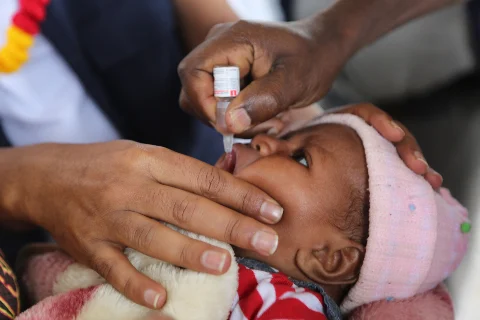The re- emergence of the poliovirus in Papua New Guinea (PNG) has prompted the National Department of Health to declare a public health emergency and urging parents and guardians to ensure little children are fully immunized against it.
For the Central Province, the Provincial Health Authority (PHA) Chief Executive Officer (CEO) Dr. James Amini is urging parents and guardians to ensure their children—including those who are already fully immunized—receive additional doses of the polio vaccine to boost and prolong their immunity to the poliovirus.
Dr. Amini confirmed that to date, no cases have been detected in the province. However, proactive measures are being taken, with vaccine outreach programs already underway in the Kairuku district. These will soon extend to other districts in Central Province.
“We haven’t received any reports from Central Province yet,” he said. “But we are acting quickly to prevent any spread.”
The virus identified is a circulating vaccine-derived poliovirus type 2 (cVDPV2). This rare form of the virus can emerge in under-immunized communities, but it is well understood and can be effectively controlled through vaccination.
Poliovirus spreads primarily through contact with the feces of an infected person or through droplets from coughing or sneezing. Even trace amounts of the virus can contaminate hands, food, or drinking water. If ingested by an unvaccinated individual, the virus may infect the gut and spread to the bloodstream or nervous system, potentially causing severe illness.
Early symptoms can include fever, fatigue, headache, sore throat, stomach pain, nausea or vomiting, neck stiffness, and muscle pain in the arms and legs. These symptoms typically last two to five days but can lead to more serious complications in some cases.
Dr. Amini stressed the importance of prevention.
“That’s why we strongly encourage everyone to get their children vaccinated. It’s far better to be protected. The strain we’re dealing with is vaccine-derived, which means it originated from the oral polio vaccine but mutated in communities with low immunity.”
He explained that vaccine-derived polioviruses (VDPVs) are linked to the weakened live virus used in the oral polio vaccine (OPV). However, both OPV (oral drops) and IPV (injections) are safe, and receiving an extra dose poses no harm—even for fully immunized children.
“Getting an additional dose is completely safe. It only strengthens immunity and helps protect our communities,” Dr. Amini emphasized.
“We will cover each district to ensure that all kids less that 5-years -old are immunized.”

